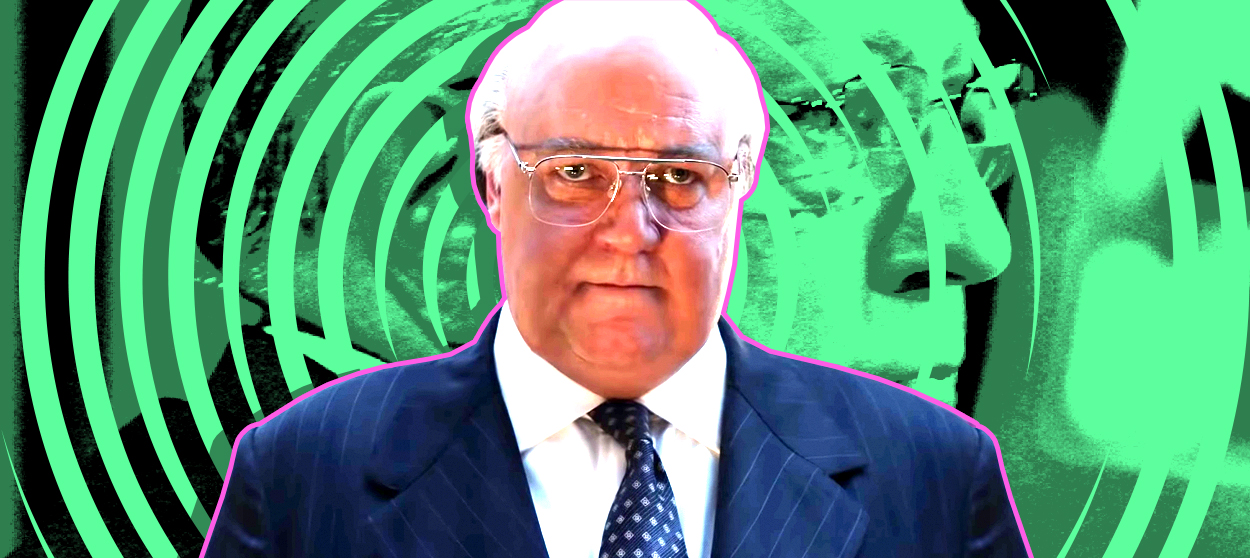Roger Ailes and the liberal myth of the conservative genius
What The Loudest Voice misses about the conservative machine


A free daily email with the biggest news stories of the day – and the best features from TheWeek.com
You are now subscribed
Your newsletter sign-up was successful
The Roger Ailes we see at the very beginning of Showtime's The Loudest Voice is already fully formed. First, we see him lying dead on his bathroom floor in 2017, speaking directly to the viewers and predicting how he will be remembered, in complete mastery of his narrative; a few seconds later, we flash back to see him negotiating his departure from NBC in 1996, in preparation, as we shortly learn, to forming Fox News for Rupert Murdoch. He already has a plan: a well-conceived theory of politics and media, a set of ideological axes to grind, and a media mogul to help him do it. But as the first episode brings Fox News from conception to birth, what's striking is how consistent he is, how unconflicted, determined, and resolute. Unlike Adam Mackay's 2018 Vice, for example — a more conventional biopic that shows us Dick Cheney's rise from youthful dissolution to national power — The Loudest Voice's Roger Ailes begins with a plan and then we see him make it into reality.
But what is the "it"? Although the seven-part miniseries charts the rise of Fox News against the eventual fall of its CEO, it's easier to be absorbed into the show's spectacle than to derive any particular insights from it. The miniseries is in love with its antihero — Russell Crowe's charisma rumbles powerfully through the prosthetics and makeup — and though I've only seen the first three episodes, I expect that his eventual downfall for sexual harassment and abuse will make good use of the character's layers of repulsion and attraction; his sexual advances are often crude and unwelcome — and his rage and cruelty in punishing subordinates is violent — but he's also a magnetic leader, with no shortage of devoted followers (of both genders). And yet the camera's infatuation with the character has a way of focusing the gaze on him to the exclusion of the rest of the world. In the first episode, we see Fox News as it was to him; in the second, we see 9/11 and the aftermath as he saw it; and in the third, we see the first year of Barack Obama's administration through Roger Ailes' eyes.
Why? There's no doubt that Ailes is an interesting figure, one of the central architects of modern American politics. As a TV producer in the 1960s, for instance, he first impressed Richard Nixon with the importance of the medium, and used that chance meeting — on the set of The Mike Douglass Show — to enter politics, serving as Nixon's media consultant on his first successful run for the presidency, in 1968. Theodore H. White's bestselling book Making of the President, 1960 had established the conventional wisdom that television had lost Nixon his first presidential race to John F. Kennedy; Joe McGinniss' The Selling of the President 1968 would chronicle Nixon's eventual victory by describing, in part, the crucial role played by Ailes and other media-savvy young men that transformed his image. Ailes would go on to parley the fame and notoriety of that book into consulting work for the entire who's-who of modern GOP presidential politics, from Ronald Reagan through the Bushes to Donald Trump. When Rupert Murdoch was looking for someone to help him build a right-wing cable news channel to rival CNN, he looked to Ailes, who built it into a GOP kingmaker.
The Week
Escape your echo chamber. Get the facts behind the news, plus analysis from multiple perspectives.

Sign up for The Week's Free Newsletters
From our morning news briefing to a weekly Good News Newsletter, get the best of The Week delivered directly to your inbox.
From our morning news briefing to a weekly Good News Newsletter, get the best of The Week delivered directly to your inbox.
If The Loudest Voice is to be believed, Fox News is a pure reflection of Ailes' ego, genius, and monstrosity, a televisual manifestation of his single-minded rage, paranoia, and endless appetites. Whatever Fox News is to you, this miniseries suggests, is because of Roger Ailes, and who he was.
I've only seen the first three episodes — the first of which aired on Sunday — but I'm not sure The Loudest Voice is to be believed. For one thing, while the miniseries is (roughly) based on Gabriel Sherman's 2014 biography of Ailes, The Loudest Voice in the Room, what's striking isn't so much what's been left out as what has been centered. Ailes spent three decades as a television producer and political consultant and two decades as CEO of Fox News, but the miniseries is only really interested in those last two (and mostly in the last 10 years of his life). And these are Roger Ailes' most important years, the culmination of a lifetime spent politicizing media and turning politics into a show; given the series' framing, it seems likely that the latter half will focus heavily on his personal downfall after former Fox & Friends co-host Gretchen Carlson filed a lawsuit for sexual misconduct, one of many whose stories of abuse at his hands began to be told. But are they our most important years?
I expect the rest of the miniseries will be interesting television, but it's strikingly uninterested in the stories that don't paint Ailes as the only significant agent or driving force. The Ailes envisaged by Tom McCarthy — who wrote and produced the show — is so magnetic that he seems to pull other people's stories into his own: the miniseries gives the impression that Ailes sells his vision of Fox News to Rupert Murdoch — who initially planned something very different — but as Sherman and others have explained, a fairly recognizable version of the network already existed, and Murdoch's plan for a right-wing alternative to Ted Turner's CNN was well in line with his entire global project. Ailes put his stamp on the network and carried it forward, of course, but he was not Fox News' singular genius. For example, it was Chet Collier — whose work on the Westminster Dog Show was a much more impressive accomplishment than The Loudest Voice implies — who screened prospective hosts with the audio muted, and who Sherman quotes as declaring that "viewers don't want to be informed, they want to feel informed." The show attributes both to Ailes. Collier was also a liberal — at least relative to Ailes — and the initial Fox News lineup was much less of a bastion of conservativism than it would eventually become (as Ailes' influence grew). But the miniseries wants to tell the story of Fox News as if it emerged, fully formed, from the brain of its leader and figurehead.
It didn't. "We Report. You Decide." was a slogan developed by an ad agency, for example, and Ailes did not — as the end of the third episode implies — coin the phrase "Make America Great Again" in 2008; it was a re-purposed Ronald Reagan line when Trump uttered it. Ailes might have helped it get from point A to point B — having consulted for both candidates — but making him the only story risks obscuring the broad conservative project that stretches from Nixon to Reagan to the Bushes to Trump. The Fox News claim to be "Fair and Balanced" — in specific opposition to what they declared to be an otherwise uniformly biased left-wing media — sounds familiar in an era where Trump declares the rest of the media his (and the American people's enemy), but Ailes didn't invent that phrase either: Nixon believed himself to be besieged by a hostile liberal media, in strikingly similar terms, and when Ailes was cutting his political teeth in the Nixon administration, he was also absorbing that philosophy of right-wing politics, one of many who did. If he was a link in that chain — and an important one — he was far from alone.
A free daily email with the biggest news stories of the day – and the best features from TheWeek.com
Why give Ailes such centrality? Why push to the sides all the much more interesting people that he worked with — starting with every elected GOP president since Nixon — and focus only on him? Indeed, why make this miniseries at all, which is the question that's been buzzing in the back of my head the entire time: Why do liberals want to make biopics mythologizing GOP figures and why do liberals want to watch them?
It's impossible, after all, not to compare The Loudest Voice to Vice — last year's biopic on Cheney — and most reviewers do. They cover such similar ground, with such similar tools, and they seem to do it for such a similar audience (and from such a similar perspective), that there feels like a collective sensibility at work: outspoken liberals who bury themselves in conservative demonology (quite literally in the case of the prosthetics that Crowe and Christian Bales wear). But if you are a fan of Fox News, or of Dick Cheney, you'll probably find them both to be a product of the kind of left-wing media bias that Ailes built an empire on complaining about. So what is the function of such entertainment? If it's odd to hear liberal audiences cheering for conservative talking points delivered by Stephen Colbert, at least The Colbert Report placed the character so firmly within a satirical framework that those cheers could be for the satire, not the sense, of his words. And though Vice is a deeply unsatisfying film — with a strange absence at its center where you'd have expected the truth of Dick Cheney to be — Adam McKay makes Dick Cheney's heart donor into the movie's narrator, so that the movie can, in the end, be about his absence as a person, the vacuum at his center.
Russell Crowe's Roger Ailes is the opposite of the vacuum. Christian Bale's opacity was perfect for the legendarily reclusive, soft-spoken Cheney, but Crowe's Ailes is impossible to take your eyes off; he's fully believable, nuanced, and layered, with depth and contrast; as repellant as he is charismatic. He embodies the role, brings it to life; he makes you believe in a singular genius who invented Fox News — and in a sense, our entire present reality — out of his own dark imagination.
This is, of course, a fiction. But I suspect it's the answer to the question of why this story of a person we love to hate is so hard not to watch: Fox News continues, day after day, but Roger Ailes' story has come to an end, reassuringly so. Telling the story of the latter, perhaps, might help us forget about the former; if the one man who created all of this has gone, then perhaps ... all of this will follow?
To put it another way, we come away from watching this story feeling informed, even if we aren't, even if we're only pandered to and reassured. But as someone once observed, isn't that what all television viewers want?
Aaron Bady is a founding editor at Popula. He was an editor at The New Inquiry and his writing has appeared in The New Yorker, The New Republic, The Nation, Pacific Standard, The Los Angeles Review of Books, and elsewhere. He lives in Oakland, California.
-
 The billionaires’ wealth tax: a catastrophe for California?
The billionaires’ wealth tax: a catastrophe for California?Talking Point Peter Thiel and Larry Page preparing to change state residency
-
 Bari Weiss’ ‘60 Minutes’ scandal is about more than one report
Bari Weiss’ ‘60 Minutes’ scandal is about more than one reportIN THE SPOTLIGHT By blocking an approved segment on a controversial prison holding US deportees in El Salvador, the editor-in-chief of CBS News has become the main story
-
 Has Zohran Mamdani shown the Democrats how to win again?
Has Zohran Mamdani shown the Democrats how to win again?Today’s Big Question New York City mayoral election touted as victory for left-wing populists but moderate centrist wins elsewhere present more complex path for Democratic Party
-
 Millions turn out for anti-Trump ‘No Kings’ rallies
Millions turn out for anti-Trump ‘No Kings’ ralliesSpeed Read An estimated 7 million people participated, 2 million more than at the first ‘No Kings’ protest in June
-
 Ghislaine Maxwell: angling for a Trump pardon
Ghislaine Maxwell: angling for a Trump pardonTalking Point Convicted sex trafficker's testimony could shed new light on president's links to Jeffrey Epstein
-
 The last words and final moments of 40 presidents
The last words and final moments of 40 presidentsThe Explainer Some are eloquent quotes worthy of the holders of the highest office in the nation, and others... aren't
-
 The JFK files: the truth at last?
The JFK files: the truth at last?In The Spotlight More than 64,000 previously classified documents relating the 1963 assassination of John F. Kennedy have been released by the Trump administration
-
 'Seriously, not literally': how should the world take Donald Trump?
'Seriously, not literally': how should the world take Donald Trump?Today's big question White House rhetoric and reality look likely to become increasingly blurred



